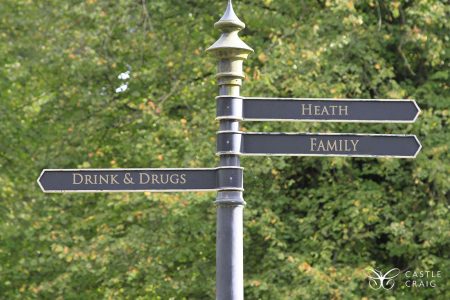Drugs can be legally prescribed and purchased or they can be obtained illegally. Either way, they can negatively affect your ability to drive safely. Alcohol, itself a drug, tends to receive more publicity as a danger to drivers but other drugs have the same potential to cause accidents and casualties. The message from Government is clear: driving under the influence of alcohol or drugs is an offence that will land you in serious trouble if caught. If in doubt, do not do it. Ignorance of any part of the law is no defence.
The Problem of Driving Under the Influence
It is illegal to drive in England, Wales and Scotland with any drug in your body, legal or illicit, if it impairs your driving. The law does not cover Northern Ireland, but you could still be arrested there if you’re unfit to drive.
Driving under the influence of drugs or alcohol or both is a major road safety problem, with drug impairment (from both legal and illegal drugs) now becoming more prevalent.
Many people receiving treatment at Castle Craig Hospital experience the nightmare of drugs or alcohol-induced driving accident which is close to the rock bottom moment in the progress of their addiction.
Why Is Drug Driving Dangerous?
- The user may be quite unaware that some drugs, perhaps prescribed quite legally, are both strong and dangerous for drivers.
- Drugs are often more difficult to detect than alcohol – your breath may not smell and you may not stagger or slur your speech
- The effects of some drugs last longer than expected, and longer than alcohol
- Some effects of drugs, such as slow reaction times, failure to process road regulations correctly and poor concentration may be undetected by the user/driver who will not, therefore, take any action to compensate, such as driving more carefully.
The Diversity of Drugs
Different drugs have different effects but they all spell trouble for car users – you wouldn’t want to be with a driver showing any of these symptoms: some, like cannabis, can slow a driver’s reaction and general response time.
Opiates such as heroin are basically sedatives which produce drowsiness and lack of concentration.
Cocaine and amphetamines are stimulants that can produce aggression and risk-taking whereas psychedelics such as LSD can produce hallucinations, confusion and blurred vision. Erratic and unpredictable behaviour usually results.
That is just some of the street drugs. Prescription drugs carry their own perils, with methadone, benzodiazepines and amphetamines at the fore – they may have been prescribed for valid reasons but that does not make them safe for drivers. You should always discuss with your GP the possible dangers of prescribed drugs before driving and act according to their advice.

Free Addiction Assessment
Physical Effects of Drugs
Any drug can have a few or even all of the following effects. None of them are desirable for a person in
charge of a vehicle, for obvious reasons:
- Erratic or aggressive behaviour
- Poor concentration
- Slow reaction times
- Drowsiness and fatigue
- Nausea and vomiting
- Hallucinations
- Panic attacks
- Confused thinking
- Inability to process directions
- Tremors and sweats
- Dizzyness
- Paranoia
- Impaired vision
Contact Us Today
Your path to lasting recovery starts here
Mixing Drugs
Mixing drugs is always dangerous and unpredictable. Cocaine and alcohol for example, are often combined as a way of regulating and enhancing their effects but doing so can be highly toxic and sometimes lethal. Generally speaking, mixing drugs makes them more dangerous and is never likely to be helpful for drivers.
Drugs Intake Is Difficult to Monitor
Alcohol intake is relatively easy to monitor (despite excesses) – we get to know our drinking needs, limits and capacity, even if we don’t abide by them.
Alcohol strength is predictable too. A bottle of a popular brand of whisky, for example, is unlikely to vary in strength, purity or effect and a bottle of eleven per cent wine is likely to be just that.
The same cannot be said for a bag of heroin or a joint, which are highly likely to have been adulterated to make them go further whatever their original strength.
In practice, drug strength can vary widely, often due to supply and demand or the greed of a dealer. Therefore, people often have no idea about the strength or nature of any drug they have ingested, and this can lead to dire consequences.
What Are the Consequences of Drink or Drug Driving?
The consequences of being found in charge of a vehicle while impaired by drink or drugs are likely to be dire
and can include:
- Accidental injury or even death
- Employment problems, especially if your work involves driving. Your employer is likely to become aware of your conviction.
- A prison sentence
- A criminal record
- A large fine
- The loss of a driving licence, and the resultant change in lifestyle because you lose your independence
- Increased insurance premiums or extreme difficulty in obtaining insurance
- The need to successfully undergo a driving test to re-acquire a licence.
- The loss of self-respect and status that follows such an event.
- You may have trouble travelling to some countries such as the USA
Drugs and Driving – Things to Remember
If you are planning to drive but know that you may be offered some form of drugs or alcohol, then you should consider the position very carefully because the is a lot at stake. If you decide you must still drive, at least keep the following points in mind:
- Be aware of the legal blood/alcohol limits in whatever country or region you are
- Be aware of the precise laws covering drug use – legal and illicit – while driving, in whatever country or region you are
- Remember alcohol and other drugs can affect you long after their immediate impact appears to have worn off
- People with drugs in their bodies present a higher road risk statistically, however safe they feel they are to drive
- Hangovers from drug or alcohol misuse can also impair driving skills and you should certainly avoid driving if you have taken any drugs or alcohol recently
- Before taking any prescribed drugs or medications, you must speak to a doctor and inform yourself of their likely effects. The NHS website is a useful source of information
- Mixing medications with alcohol or other drugs is dangerous and unpredictable not least because of the chemical complexities of many substances. You do so at your peril. If for some reason it cannot be avoided, you must discuss it with a healthcare professional.
Plan Ahead
If you know you’re going to consume alcohol or other drugs, including prescription medications, and maybe mix them too, then at least plan ahead so that you keep yourself and the public safe. It could save you an awful lot of grief. Here are some guidelines to consider:
- Leave your car keys at home
- Nominate a designated driver
- Consider public transport, taxis or sharing a ride
- Ask a family member or friend to pick you up
- Consider an overnight stay.
If you use drugs of any kind, from any source, the safest option is always not to drive. If you spontaneously have a drink or try a joint, then stay within limits or seek a lift home.
Be vigilant with others too; by challenging a friend or colleague’s ability to drive, you could save lives. Not getting in the driver’s seat, or stopping someone else doing so, might not seem a big deal at the time but you might just have saved your life, and others too.








